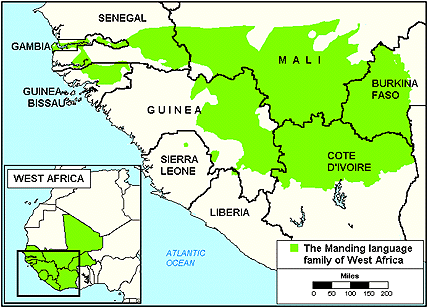|
|
Prayer Profile
The Malinke of Burkina Faso
![[IMAGE]](../images1/0155.jpg) The Malinke speak Malinke, one of many Manding languages. The Manding languages are spoken in nine African nations by approximately 11 million people. Although some of these languages have no written script, their oral literature is regarded as some of the best in the world.
The Malinke speak Malinke, one of many Manding languages. The Manding languages are spoken in nine African nations by approximately 11 million people. Although some of these languages have no written script, their oral literature is regarded as some of the best in the world.
Most Manding speakers can trace their roots back to the once great Mali Empire, which rose to power in the 1200's under the rule of the "lion king," Sundiata. After unifying the kingdom, Sundiata began conquering the surrounding peoples.
There are three clear divisions within Malinke society: free-born, artisans, and slaves. The free-born class is the most diverse. It formerly consisted of only noble rulers. Today, however, it includes merchants, farmers, and others. The artisans include leather craftsmen, blacksmiths, and singers, or griots. Artisans are looked upon with fear and awe because their crafts often involve spiritual rituals.
What Are Their Lives Like?
Most of the Malinke are farmers. They do not use irrigation, and hoe their fields by hand. Rice, millet, sorghum, and peanuts are their staple crops. While they raise most of their own food, some products are obtained through trade and some are gathered from the forests.
During planting and harvesting seasons, much time is spent in the fields. At other times, the men work in part-time businesses to supplement their incomes. Others raise goats, sheep, bees, poultry, and dogs. Cattle are sometimes kept, but only to gain prestige, to use as ritual sacrifices, or to use as a "bride price."
Malinke society is patrilineal (inheritances are passed down through the males). The oldest male serves as the head of the lineage. (A "minor lineage" consists of a man and his immediate family. A "major lineage" consists of households of relatives and their families.) The smallest social unit is the family; the next larger unit is the "hamlet," or village settlement. The hamlets are made up of clans, or family groups all having the same name.
Each Malinke village is surrounded by a wall, and the homes are either round or rectangular. They are made of sun-dried brick with either thatch or terraced roofs. The men do the heavy farm work, hunt, and fish. They are also responsible for village-based leadership positions, such as headman and imam, or religious leader. The women cook, clean, care for the children, help with the farming, and help the men gather produce from the forests.
Traditionally, parents arranged their daughters' marriages while the girls were still infants. Today, marriages are still arranged, but not as early. The groom is required to work for the bride's family both before and after the wedding. He must also pay the girl's family a "bride price." Unlimited polygamy is permitted among the Malinke, but the men rarely have more than three wives.
What Are Their Beliefs?
Islam was first introduced to the Mali Empire by foreign merchants. Gradually, Islam was blended with their traditional beliefs, which involved worshipping the spirits of the land. Today, it is not uncommon for someone to first pray in the village mosque, then sacrifice a chicken to the "village spirit."
Most of the Malinke observe Islamic rituals with little understanding of what they really mean. They view Allah as being the one supreme god. However, they also see him as inaccessible and little concerned with the daily affairs of his creation. Many of the Malinke consult marabouts (Muslim "holy men") for healing, protective amulets, or insight into the future. The more educated Malinke often conceal their beliefs in this type of magic. However, there are very few villagers who do not have amulets in their possessions.
What Are Their Needs?
Portions of scripture are available in the Malinke language; unfortunately, however, very few of the people can read. Perhaps Christian teachers will find open doors to reach them with the Gospel.
Prayer Points
- Ask the Holy Spirit to grant wisdom and favor to the missions agencies that are currently targeting the Malinke.
- Pray for the effectiveness of the Jesus film among the Malinke.
- Ask God to anoint the Gospel as it goes forth via radio in their area.
- Pray that God will reveal Himself to the Malinke through dreams and visions.
- Pray that God will give the Malinke believers boldness to share the love of Christ with their own people.
- Take authority over the spiritual principalities and powers that have kept the Malinke bound for many generations.
- Ask God to raise up prayer teams who will begin breaking up the spiritual soil of Burkina Faso through intercession.
- Pray that strong local churches will be planted among the Malinke.

Statistics
Latest estimates from the World Evangelization Research Center.
THE PEOPLE
- People name: Malinike
- Country: Burkina Faso
- Their language: Maninka
- Population:
- Largest religion:
- Christians: 1.5%
- Church members: 1,238
- Scriptures in their own language: New Testament
- Jesus Film in their own language: Available
- Christian broadcasts in their own language: Available
- Mission agencies working among this people: 4
- Persons who have heard the Gospel: 33,400 (41%)
- Persons who have never heard the Gospel: 49,200 (59%)
THEIR COUNTRY
- Country: Burkina Faso
- Population:
- Major peoples in size order:
- Major religions:
- Number of denominations: 17
© Copyright 1997
Bethany World Prayer Center
This profile may be copied and distributed without obtaining permission
as long as it is not altered, bound, published
or used for profit purposes.
![[HOME BUTTON]](../graphics/home.jpg)
![[CALENDAR BUTTON]](../graphics/calico.jpg)
![[LIST BUTTON]](../graphics/listico.jpg)
[Home]
[Calendar]
[Country List]
|